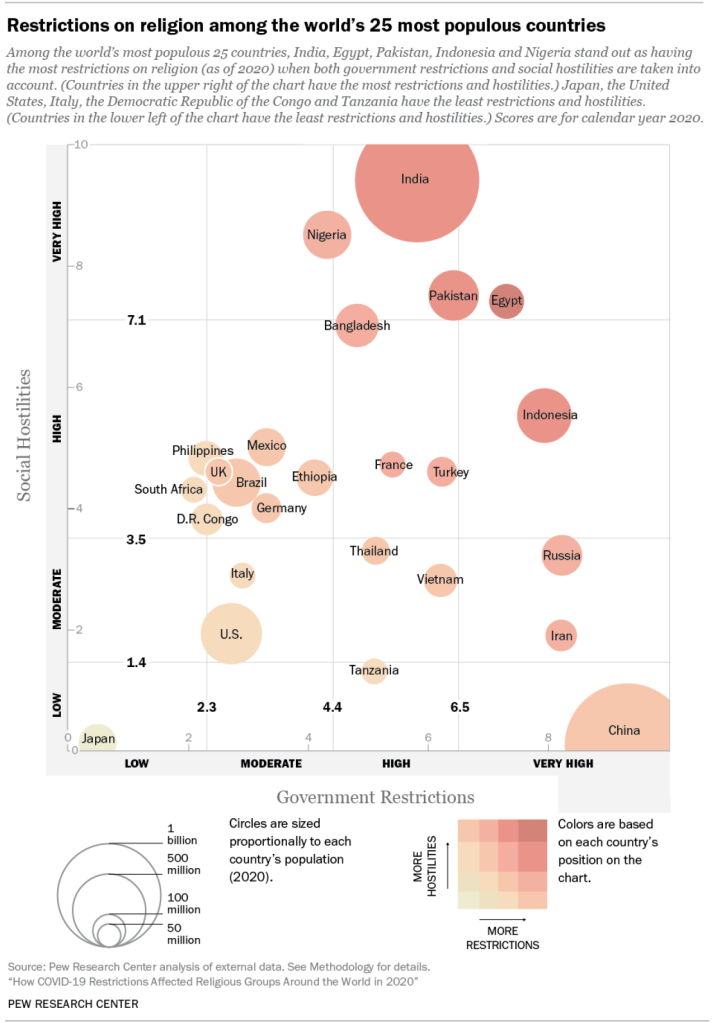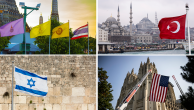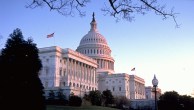More than 5 billion people – almost three-quarters of the global population – live in the world’s 25 most populous countries. Looking at the levels of restrictions on religion in just these countries can help illuminate how a very sizable segment of the world’s population may be affected by government policies or social hostilities involving religion. At the same time, it is important to note that restrictions on religion analyzed in this study do not affect everyone in a given country the same way, and that in some cases minority religious groups may be impacted more.
In 2020, the countries in this group that had the highest levels of overall restrictions (both government restrictions and social hostilities) were India, Egypt, Pakistan, Indonesia and Nigeria. The countries with the lowest levels of overall restrictions among the 25 most populous countries were Japan, the United States, Italy, the Democratic Republic of the Congo and Tanzania.
Looking at just government restrictions on religion, the countries with the highest levels from this group of 25 were China, Russia, Iran, Indonesia and Egypt. All had “very high” scores on the Government Restrictions Index (GRI). Meanwhile, the lowest levels of government restrictions in this group were recorded in Japan, South Africa, the Democratic Republic of the Congo, the Philippines and Brazil. (Brazil had “moderate” levels of government restrictions while the other four had “low” levels.)
Among the most populous countries, the highest levels of social hostilities involving religion were in India, Nigeria, Pakistan, Egypt and Bangladesh. All these countries with the exception of Bangladesh had “very high” social hostilities in 2020, while Bangladesh fell into the “high” category on the Social Hostilities Index (SHI). Japan, China, Tanzania, the U.S. and Iran had the lowest levels of social hostilities in this group. The U.S. and Iran had “moderate” levels of social hostilities, while the other three countries had “low” levels.
In several of the most populous countries, levels of government restrictions mirrored social hostilities. For example, Japan ranked “low” on both the GRI and SHI, Italy and the U.S. had “moderate” scores on both indexes, and Egypt had “very high” government restrictions and social hostilities. In other countries, the GRI and SHI levels were sharply different. In China, for example, government restrictions continued to fall into the “very high” category, while social hostilities stayed at a “low” level. Iran had “very high” government restrictions and “moderate” social hostilities. Conversely, Nigeria had a “moderate” score on the GRI and a “very high” SHI score in 2020.
Within the government restrictions category, no country among the 25 most populous experienced a large change (2 points or more) in its score. Most countries had small changes in their GRI scores (less than 1 point), while Egypt had a modest decrease of 1.0 point.
There were more substantial fluctuations from 2019 to 2020 on the Social Hostilities Index. Germany had a large decline in its SHI score (2.0 points), while Tanzania, Ethiopia and Russia had modest decreases, and France, South Africa and Italy experienced modest increases.6
Several countries among the 25 most populous fell into different categories on the SHI in 2020 than they did in 2019. For example, Thailand’s and Russia’s social hostilities fell from “high” to “moderate,” while Tanzania’s declined from “moderate” to “low.” South Africa, France and the Democratic Republic of the Congo rose from “moderate” to “high” levels of social hostilities, while Egypt moved from “high” to “very high.” In France, there were physical assaults against members of several religious groups, including Jehovah’s Witnesses, Jews and Muslims. In addition, in October 2020, a Muslim teenager killed a teacher in a Paris suburb in retaliation for showing cartoons of the Prophet Muhammad as part of a lesson on freedom of expression. (Police later killed the attacker and charged 10 other people, including an imam, with assisting him.)





